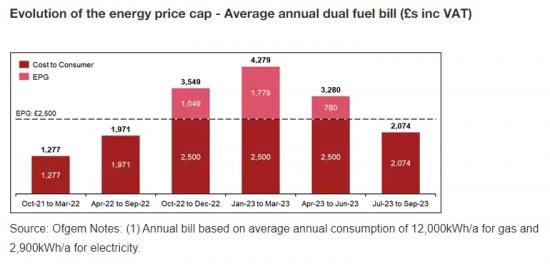PwC comments on the quarterly update to the energy price cap
29th May 2023

Vicky Parker, Head of Power and Utilities at PwC UK, said, "Ofgem today published the updated default tariff Cap (DTC) ‘Energy price cap' level for the period commencing 01 July and running through to 30 September 2023. The announced level will result in the average annual household energy bill reducing to £2,074. This represents an equivalent reduction of £1,206 in the level of the cap but a reduction in the cost to households of £426, owing to the introduction of the Energy Price Guarantee (EPG) in October 2022, which capped consumer prices at £2,500.
"The reduction of the energy price cap reflects the reduction in wholesale gas and electricity prices, which have retreated significantly since autumn 2022, as confidence in the ability of the European energy system to manage without Russian gas has grown. The reduction in gas prices is apparent in the wholesale costs element of the DTC, which has fallen from £515/MWh for Jan-23 to Mar-23 to £159/MWh for July 23 to September 23.
“The reduction in household bills is not as large as the reduction in the price cap (owing to the EPG), but the news will be well received by households, whose annual budgets have been put under considerable strain by rising energy and food prices as well as general levels of inflation. That said, average annual bills still remain markedly above pre-pandemic levels of around £1,200. Equally, householders may not begin to feel the immediate benefits of the price reduction, since average monthly consumption levels are lower in the summer and many consumers will need their suppliers to adjust direct debits before a reduction in monthly energy bills is felt.
“Following the Ofgem imposed ban on acquisition tariffs from Apr-22, the majority of households are now on the default tariff and so will benefit from the reduction in the cap. However, following today's announcement, the energy market may begin to open up as suppliers look to introduce fixed tariffs below the DTC, in an effort to win customers. Owing to the lag in the price setting mechanics for the cap, forward prices are lower than the wholesale costs element captured in the methodology, with Q3 2022 prices trading at around £90/MWh. This could result in further savings for households and the average annual household bill dipping below tariff levels not seen since before April 2022 as suppliers capture lower wholesale costs through lower tariffs."
What will suppliers make of today’s update?
“While the reduction in the cap will be welcomed by consumers, the news may receive a more mixed reaction from suppliers. The opening of competition will result in some suppliers winning customers and others losing customers as well as additional downward pressure on margins, which have to some degree been managed through the default tariff cap. Added to this, the reduction in tariff levels below the Energy Price Guarantee level of £2,500, will potentially remove some net working capital benefit, since ‘top-up’ payments made by government are typically more frequently received than customer payments e.g. direct debits.
“Overall, the reduction in wholesale prices and these reductions have to be viewed as a very positive development, given the pressure that high prices puts on household costs and the wider economy."
Comment
Households will also feel the pinch due to the ending of the £66 per month for energy support that cushioned the problem for 6 months.
